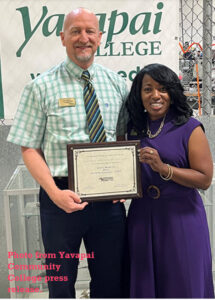Cost is $85 Per Person or $130 A Couple | educational and fun | Must register and be over 21
The Yavapai Community College is offering a private wine tasting experience at the Verde Valley Campus Southwest Wine Center on September 13th. It will also offer the same program in October and possibly November.
The cost is $85 per person or $130 per couple per program. The session lasts 1.5 hours.
The College in its advertisement of the program says the following: “Our 1.5-hour Private Wine Tasting Experience provides an educational experience for attendees to further to develop their palate through sensory evaluation. As we move through a flight of SWC student-crafted wines, we will describe the essential components of wine tasting to deepen your connection with what’s in your glass. This session will focus on individual palate development and creating YOUR own unique ways of describing what you sense on YOUR palate.”
Participants must be 21. You may register by clicking here.




 Yavapai Community College president Dr. Lisa Rhine has announced a tuition waiver update for faculty and staff. It was not clear whether the benefit is immediately available or faculty and staff must wait until spring 2024.
Yavapai Community College president Dr. Lisa Rhine has announced a tuition waiver update for faculty and staff. It was not clear whether the benefit is immediately available or faculty and staff must wait until spring 2024. Glendale Community College has taken a pioneering step in the realm of cybersecurity education with the inauguration of its cutting-edge Cybersecurity Operations Center (GSOC). The center stands as a testament to the college’s commitment to both its students and the broader community.
Glendale Community College has taken a pioneering step in the realm of cybersecurity education with the inauguration of its cutting-edge Cybersecurity Operations Center (GSOC). The center stands as a testament to the college’s commitment to both its students and the broader community. Over the course of the last decade, Yavapai Community College has demonstrated an unwavering commitment
Over the course of the last decade, Yavapai Community College has demonstrated an unwavering commitment to the enhancement of its facilities and academic offerings on the Prescott Campus. This is particularly true when it comes to the Performing Arts Department. Through millions in financial investments and the recruitment of exceptional teaching talent, the Community College has pursued the establishment of an extraordinary performing arts program. Evidently, this ambition has been resoundingly realized.
to the enhancement of its facilities and academic offerings on the Prescott Campus. This is particularly true when it comes to the Performing Arts Department. Through millions in financial investments and the recruitment of exceptional teaching talent, the Community College has pursued the establishment of an extraordinary performing arts program. Evidently, this ambition has been resoundingly realized. The Community College has also wisely actively engaged the local Prescott community in its initiatives. Opportunities abound for community members to participate and collaborate, further fostering a sense of integration between the institution and its surroundings. The Master Chorale, Community Chorale, Chamber Singers, and Women’s Chorale, which heavily involve the Prescott community, exemplify this synergy.
The Community College has also wisely actively engaged the local Prescott community in its initiatives. Opportunities abound for community members to participate and collaborate, further fostering a sense of integration between the institution and its surroundings. The Master Chorale, Community Chorale, Chamber Singers, and Women’s Chorale, which heavily involve the Prescott community, exemplify this synergy.






